Full solution
Q. What is the sum of the solutions to the given equation?Choose answer:(A) (B) (C) (D)
- Identify quadratic equation: Identify the quadratic equation and its standard form.The given quadratic equation is .A quadratic equation is generally given in the standard form .
- Apply sum of roots formula: Apply the formula for the sum of the roots of a quadratic equation.The sum of the roots of a quadratic equation is given by .
- Calculate sum of roots: Calculate the sum of the roots using the coefficients from the given equation.For the given equation , and .The sum of the roots is .
- Simplify expression for sum of roots: Simplify the expression to find the sum of the roots.The sum of the roots is .
More problems from Compare linear and exponential growth
QuestionGet tutor help
QuestionGet tutor help
QuestionGet tutor help
QuestionGet tutor help
QuestionGet tutor help
QuestionGet tutor help
QuestionGet tutor help

